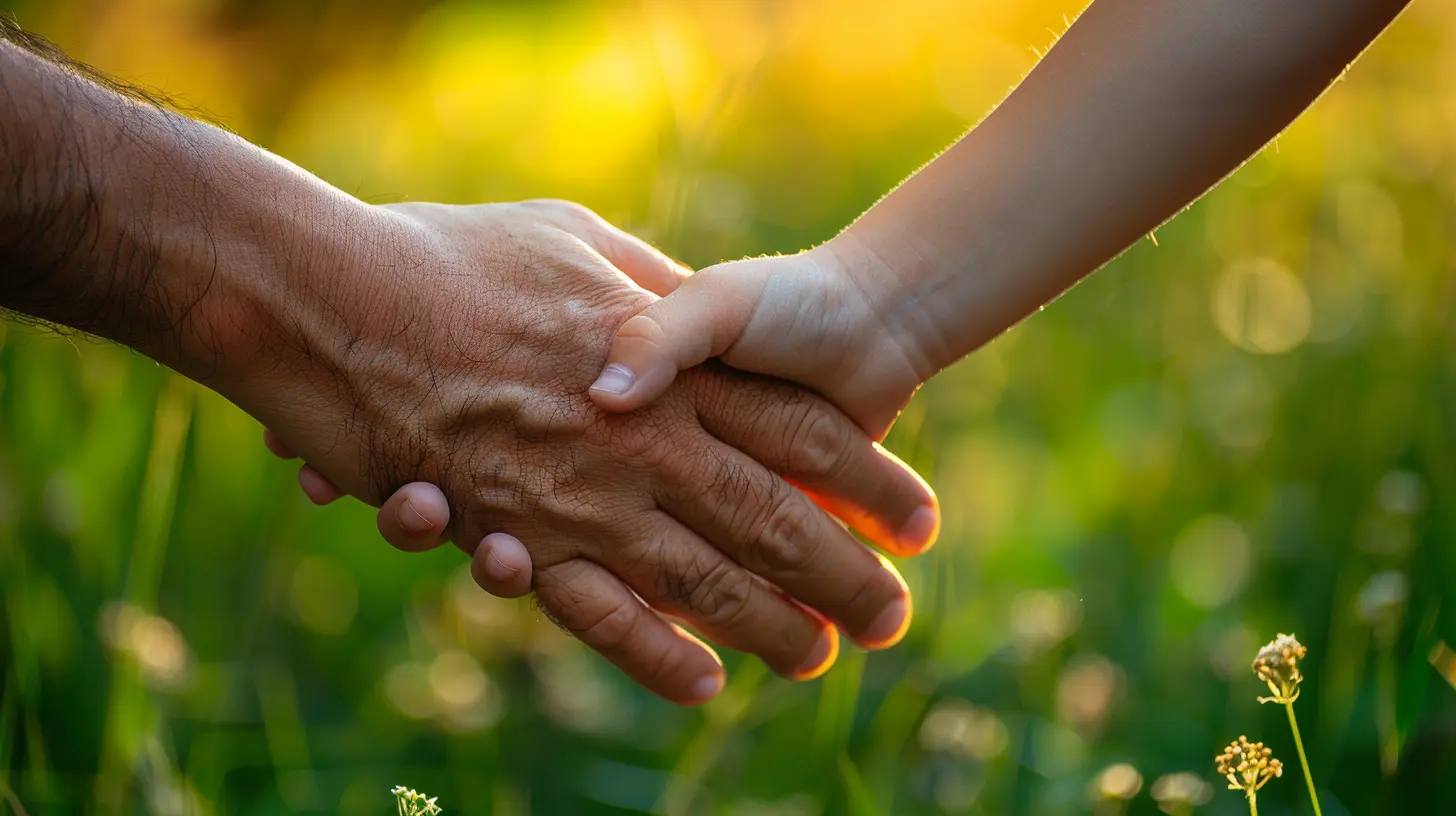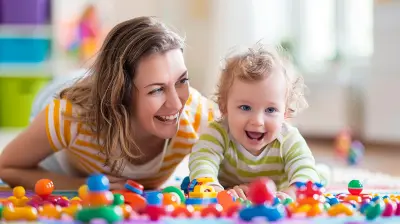25 November 2024
As parents, we spend countless hours thinking about how to help our children grow into kind, confident, and well-rounded individuals. We ponder different parenting styles, nutrition, education, and even their screen time. But how often do we stop to consider the significance of something as simple as a hug, a handshake, or a gentle stroke on a child’s back?
Physical touch isn’t merely a fleeting act of affection—it plays a vital role in our children's development, both emotionally and physically. In fact, the act of affection through physical touch can be the silent hero in shaping not just their bodies but also their minds. Let’s dive into the depths of this fundamental human behavior and explore how physical touch impacts development from birth and beyond.

The Science Behind Physical Touch
Before we begin talking about its implications, let’s dive a bit into the scientific reasons why physical touch is so crucial for development. You might be surprised to learn that humans are wired for touch. From the moment of birth, babies crave skin-to-skin contact with their caregivers, and this isn't by accident.When humans are touched, especially in comforting ways, the body releases oxytocin, often called the "love hormone" or "cuddle hormone." Oxytocin creates a feeling of connection, relaxation, and stress relief. It’s what makes you feel that warm, fuzzy sensation when someone hugs you, and it's not just a fleeting emotion. Oxytocin can influence mood, behavior, and even how you bond with others.
But that’s not the only benefit. Physical touch can also lower levels of cortisol—the stress hormone. And this doesn’t just apply to adults—infants and young children are especially sensitive to stress, and touch can do wonders to soothe them.
So, what does this mean for your child’s development? Let’s break it down.

Physical Touch and Infant Development
1. Bonding and Attachment
Here’s the thing: touch is often the first language a baby understands. From the moment they are born, infants rely on the warmth and comfort of being held. This skin-to-skin contact fosters initial bonding between a newborn and their parents. Research shows that touch can enhance the attachment between a caregiver and a baby, making the child feel secure and cared for.Babies who receive regular, affectionate touch through holding, cuddling, and skin-to-skin contact tend to form stronger emotional bonds with their caregivers. These bonds, in turn, help the child develop a sense of trust and security in the world around them.
This attachment isn’t just about making your baby "feel good" in the moment, though. It has long-lasting effects. Secure attachment during infancy has been linked to healthy emotional and social development down the line. Children who experience strong bonds with their caregivers often grow up to be more empathetic, self-assured, and able to build healthy relationships with others.
2. Cognitive Growth
Did you know that physical touch can also support cognitive development? It’s true! When a baby is touched, held, or gently caressed, it stimulates neural pathways in the brain. Early, consistent touch can actually spark brain growth! This is because touch activates the vagus nerve, which is key in regulating many of the body's functions including digestion, heart rate, and—believe it or not—emotional regulation.Studies have shown that babies who are regularly touched in a loving and responsive manner experience enhanced brain development. In other words, the more you hold and touch your baby, the more you’re helping their brain build essential connections that will help them process the world around them.
3. Healthy Physical Growth
Touch also plays a role in supporting the physical growth of infants. Think about it this way: touch isn’t just nurturing the emotional brain; it’s encouraging the body to grow as well. Premature babies who receive regular touch therapy, like baby massages, often gain weight faster and show better overall health outcomes compared to those who don’t receive as much touch.The sense of security that physical touch provides can also promote healthy sleep patterns. Well-rested babies tend to grow better, both physically and developmentally, making touch a key factor in setting the stage for healthy physical growth.

The Power of Physical Touch in Childhood
As your baby grows into toddlerhood and beyond, the need for physical touch doesn’t disappear. In fact, it remains just as critical for both emotional and physical development.1. Emotional Regulation and Confidence
Remember that relaxing feeling you get when someone rubs your back or holds your hand during a stressful moment? The same goes for toddlers and young children. Physical touch can be incredibly grounding and supportive during overwhelming emotions.Hugs, gentle pats on the back, or simply sitting closely with your child will trigger those calming releases of oxytocin, helping them manage their emotions. This kind of physical reassurance teaches children that they can trust their caregivers and the world around them. It also boosts their confidence in handling future emotional challenges.
2. Social Development and Empathy
When children experience regular affectionate touch, they learn very early on what kindness and connection feel like. These foundational experiences are crucial in developing empathy—an essential social skill.Simply put, physical touch helps children tune into the emotions of others. If a child consistently experiences warmth and affection from their parents or caregivers, they’re likely to offer the same to their peers. This makes them better at both forming and maintaining relationships, which is key for their social development.
3. Building Resilience
Touch can also help build resilience in children—a vital trait in overcoming challenges as they grow. Just as adults often rely on a comforting hug or a moral boost from supportive touch, children learn to associate physical affection with strength and encouragement.For example, when a child falls and scrapes their knee, being hugged or gently comforted not only soothes the immediate stress but also teaches them that while setbacks happen, they are not insurmountable. It’s a subtle but important life lesson that helps children develop resilience in the face of life's inevitable bumps.

Touch in Adolescence: Why it Still Matters
By the time kids reach adolescence, many parents might feel a little awkward offering physical affection. Puberty happens, boundaries change, and some teens may feel embarrassed about hugs and closeness. But don't let that fool you—physical touch remains a key factor in their emotional and psychological well-being.While adolescents may seek more independence, they still need those reassuring touches, even if it’s a pat on the back, sitting close during a movie, or a playful nudge.
1. Managing Stress and Mental Health
The teenage years can be tough—exams, friendships, body changes, and identity exploration. All of these can lead to heightened levels of stress. Just like in toddlers, physical touch can provide emotional reassurance and reduce high levels of cortisol in teens. That quick shoulder rub or hand on the arm might be just the grounding they need to feel supported, even when they’re not asking for it.2. Maintaining Connection
Touch is a form of communication. When fewer words are exchanged (which is often the case with teenagers), touch can act as a powerful reminder that you’re still there, that they’re still loved, and that they’re not alone through the often stormy waters of adolescence.Culturally, How Much Touch is "Enough"?
Let’s be realistic—different cultures approach physical touch in varied ways. Some cultures are highly affectionate and prioritize regular physical interaction, while others may favor more personal space.The key takeaway is this: regardless of cultural differences, every child needs some form of positive touch to thrive. What matters most is ensuring that your child feels safe, supported, and loved through your touch. You don't have to force a hug if it feels unnatural; simply offering a gentle touch on the arm or hand-holding when appropriate can make all the difference.
Can You Offer Too Much Touch?
While physical touch is incredibly beneficial, balance is key. It’s important to be attuned to your child’s individual preferences and needs. Some kids thrive on constant touch, while others may need more personal space.Respecting your child’s personal boundaries is just as important as providing affection. Teaching them about personal consent—when and how they want to be touched—can help foster their self-confidence and autonomy.
Conclusion: Why Physical Touch is Non-Negotiable
At the end of the day, physical touch is not just a “nice-to-have” aspect of parenting—it’s essential. From infancy to teenage years, physical affection goes hand in hand with emotional, social, and cognitive development. A simple hug, a hand on the shoulder, or even holding hands can do wonders for your child’s growth, truly making physical touch the unsung hero of healthy development.So, the next time you’re unsure of how to support your child, remember that sometimes the best thing you can offer is a warm, reassuring touch. It’s not just about affection— it’s about laying the foundation for a happy, healthy future for your child.










Seth McCray
Touch is the magic ingredient in the recipe of development—skip it at your own risk! Parenting isn’t just about the big talks; it’s also the little hugs that nurture those tiny brains. Get touching!
February 10, 2025 at 4:53 PM